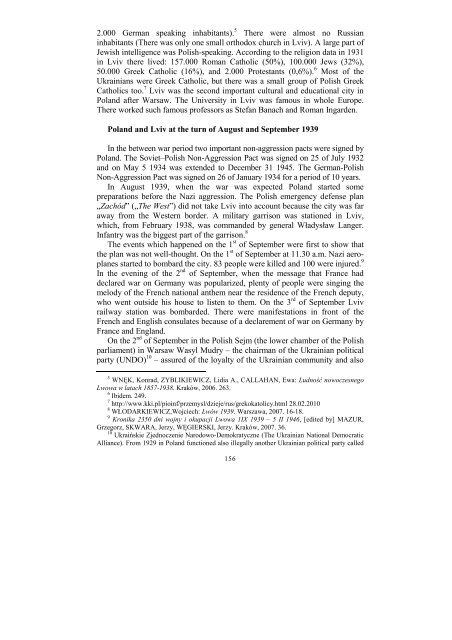The Molotov-Ribbentrop Pact - ELTE BTK Történelem Szakos Portál
The Molotov-Ribbentrop Pact - ELTE BTK Történelem Szakos Portál
The Molotov-Ribbentrop Pact - ELTE BTK Történelem Szakos Portál
You also want an ePaper? Increase the reach of your titles
YUMPU automatically turns print PDFs into web optimized ePapers that Google loves.
2.000 German speaking inhabitants). 5 <strong>The</strong>re were almost no Russian<br />
inhabitants (<strong>The</strong>re was only one small orthodox church in Lviv). A large part of<br />
Jewish intelligence was Polish-speaking. According to the religion data in 1931<br />
in Lviv there lived: 157.000 Roman Catholic (50%), 100.000 Jews (32%),<br />
50.000 Greek Catholic (16%), and 2.000 Protestants (0,6%). 6 Most of the<br />
Ukrainians were Greek Catholic, but there was a small group of Polish Greek<br />
Catholics too. 7 Lviv was the second important cultural and educational city in<br />
Poland after Warsaw. <strong>The</strong> University in Lviv was famous in whole Europe.<br />
<strong>The</strong>re worked such famous professors as Stefan Banach and Roman Ingarden.<br />
Poland and Lviv at the turn of August and September 1939<br />
In the between war period two important non-aggression pacts were signed by<br />
Poland. <strong>The</strong> Soviet–Polish Non-Aggression <strong>Pact</strong> was signed on 25 of July 1932<br />
and on May 5 1934 was extended to December 31 1945. <strong>The</strong> German-Polish<br />
Non-Aggression <strong>Pact</strong> was signed on 26 of January 1934 for a period of 10 years.<br />
In August 1939, when the war was expected Poland started some<br />
preparations before the Nazi aggression. <strong>The</strong> Polish emergency defense plan<br />
„Zachód” („<strong>The</strong> West”) did not take Lviv into account because the city was far<br />
away from the Western border. A military garrison was stationed in Lviv,<br />
which, from February 1938, was commanded by general Władysław Langer.<br />
Infantry was the biggest part of the garrison. 8<br />
<strong>The</strong> events which happened on the 1 st of September were first to show that<br />
the plan was not well-thought. On the 1 st of September at 11.30 a.m. Nazi aeroplanes<br />
started to bombard the city. 83 people were killed and 100 were injured. 9<br />
In the evening of the 2 nd of September, when the message that France had<br />
declared war on Germany was popularized, plenty of people were singing the<br />
melody of the French national anthem near the residence of the French deputy,<br />
who went outside his house to listen to them. On the 3 rd of September Lviv<br />
railway station was bombarded. <strong>The</strong>re were manifestations in front of the<br />
French and English consulates because of a declarement of war on Germany by<br />
France and England.<br />
On the 2 nd of September in the Polish Sejm (the lower chamber of the Polish<br />
parliament) in Warsaw Wasyl Mudry – the chairman of the Ukrainian political<br />
party (UNDO) 10 – assured of the loyalty of the Ukrainian community and also<br />
5 WNĘK, Konrad, ZYBLIKIEWICZ, Lidia A., CALLAHAN, Ewa: Ludność nowoczesnego<br />
Lwowa w latach 1857-1938. Kraków, 2006. 263.<br />
6 Ibidem. 249.<br />
7 http://www.kki.pl/pioinf/przemysl/dzieje/rus/grekokatolicy.html 28.02.2010<br />
8 WŁODARKIEWICZ,Wojciech: Lwów 1939. Warszawa, 2007. 16-18.<br />
9 Kronika 2350 dni wojny i okupacji Lwowa 1IX 1939 – 5 II 1946, [edited by] MAZUR,<br />
Grzegorz, SKWARA, Jerzy, WĘGIERSKI, Jerzy. Kraków, 2007. 36.<br />
10 Ukraińskie Zjednoczenie Narodowo-Demokratyczne (<strong>The</strong> Ukrainian National Democratic<br />
Alliance). From 1929 in Poland functioned also illegally another Ukrainian political party called<br />
156













